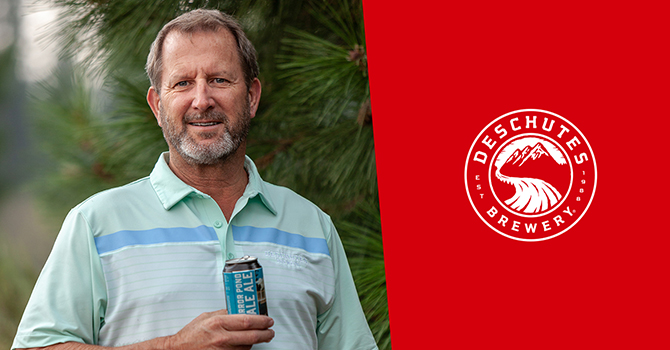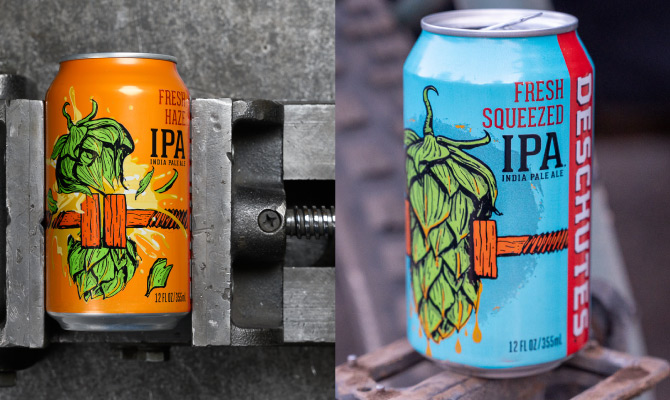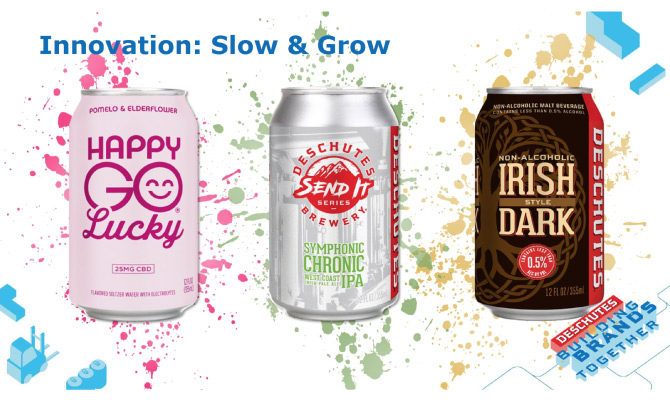
Deschutes founder Gary Fish was up-front with wholesalers during the Bend, Oregon-headquartered craft brewery’s virtual distributor summit held earlier this week.
“It’s no secret that over the past four years, Deschutes Brewery’s sales have been in decline, even without the current pandemic,” he said. “We had been in a growing world of hurt. We invested heavily in capital expansion, believing we could maintain our brands’ trajectory. The same as we had over the past three plus decades.”
Fish then dropped an analogy perfect for the start of college and professional football seasons. Deschutes had built the stadium, but its team “was not built to win.”
“We realized the change was required, and we committed to that change,” he said. “We began to build a team that was designed to win.”
According to Fish, once Deschutes had its final strategic hire in place — director of national accounts Steve Malcomson, who joined the company after nearly a decade at Lagunitas — “the world fell apart” due to the COVID-19 pandemic.
The entire on-premise business dried up, taking away a quarter of Deschutes’ sales through distribution, as well as the company’s brewpubs, which accounted for another 20% of the company’s revenue.
“Nonetheless, what we have is the team we’ve been seeking, and the focus to create the organization we’ve always needed,” Fish said. “We have a lean and effective organization, the likes we’ve never seen before. And our sales results are showing it.”
Fish proclaimed that no other craft brewery will be more focused than Deschutes in 2021.

Deschutes VP of sales and marketing Neal Stewart doubled down on that proclamation, adding that the company will be “laser focused” through the rest of 2020 and for all of 2021.
Despite the adversity from COVID, Stewart said Deschutes shipped more beer in June 2020 than it did in June 2019. That’s going to repeat in September.
“It’s not about just mitigating the damage — it’s actually all about growing the business right now,” he said.
In the past, Stewart admitted that Deschutes got caught up in the “rat race” of craft beer and stopped playing its own game, instead turning to large advertising campaigns and experiential marketing programs that traveled across the country.
“Those are great tactics to engage in a certain consumer audience, but they’re expensive and they take a lot of people to execute,” he said. “And so my point of view is that we didn’t take the opportunities that were staring us right in the face.”
“We are healthier today than we were a year ago,” he added.

As Brewbound reported Thursday, Deschutes’ focus in 2021 is on what it’s done for the last 32 years: beer. Specifically, the company’s goal is to grow distribution of its top IPA brands, Fresh Squeezed and Fresh Haze, side-by-side in retailers. With Malcomson in the fold, the company is targeting national accounts, and has built out its team, adding two reps in southern California and one in Ohio focused on Kroger.
Deschutes is also leaning heavily into cans in 2021, and Stewart proclaimed this “the year of the 12-pack.” Stewart called 12-packs “critical” to the growth of Fresh Squeezed and Fresh Haze. He also issued a challenge to Deschutes’ wholesaler partners.
“We still have 100,000 barrels of canning line capacity available in our Bend brewery,” he said. “My challenge to you is, let’s fill that up. Let’s do that in 2021.”
Deschutes executives also spent a fair amount of time discussing their approach to innovation.
As such, the company is maintaining a “slow and grow” strategy to new products, proving many of them first at its pubs before taking products to broader markets.
Deschutes CEO Michael LaLonde said the company is taking a two-pronged approach to new products. The first, is “slow and grow,” developing new offerings at its pubs and tasting rooms, as well as packaging them and selling them locally.
“If they start getting some traction, then we’ll expand distribution in concentric circles until it makes sense to launch a whole state or maybe the Northwest,” he said. “So we don’t put the risk into some new brands that we launch, like we did with Modified Theory.”

Among the products that Deschutes is taking that approach with are:
- Happy Go Lucky, a CBD seltzer water that has been sold in Deschutes’ tasting rooms and pubs and the company eventually plans to sell in Oregon.
- Symphonic Chronic West Coast IPA, the first in what the company is calling its “Send It Series” brand incubation line. Send It Series products will be sold in limited quantities at its owned and operated properties and some retail locations in Oregon before potentially reaching full commercialization across the Pacific Northwest.
- Non-Alcoholic Irish Dark beer, which launched in the summer at Deschutes’ locations, as well as direct-to-consumer.
The second innovation strategy is launching obvious products in the IPA and imperial IPA category, in what LaLonde called a “fast-follower approach.” An example is Royal Fresh, a 9% ABV imperial IPA.
“There are certain opportunities that are staring us right in the face, and that’s the challenge that we’ve given ourselves this year,” Stewart added. “Be aware of what those opportunities are and take them. Don’t get too cute with it. Take the opportunities that can drive the business right now and make it happen and grow the business that way.”